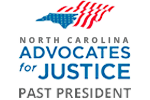YOUR LAWYERS.











NC Workers’ Compensation Lawyer – Jay Gervasi – Part 2
Noted Greensboro Workers’ Compensation Attorney Jay Gervasi joins Law Talk with Bill Powers to discuss the practice of law.
Jay Gervasi: You mentioned the transition, I actually got fired twice from two firms working on the bad guy side, I use the term bad guy sort of jokingly because I’ve got a lot of good friends on the other side, but I realized after the second one that I probably shouldn’t be doing work for insurance companies anymore. So I kind of got kicked over the fence and things have worked out a lot better in the last 30 years.
Bill Powers: Nice. Yeah, I actually pretty consistently refer to myself as the accidental lawyer. I did not have any want or desire, really, growing up, to be an attorney. I didn’t have this entirely altruistic purpose for going to law school, I didn’t want to get a job. And so I ended up going to law school.
Jay Gervasi: You became a lawyer instead of getting a job, which is the way I view it too.
Bill Powers: Right. Well, and we’re very blessed to be lawyers in what we do but it’s also, as I like to say it’s a difficult way to make a living. Workers’ compensation is, I think you see, I don’t know, this is my anecdotal belief but I think you tend to see a higher percentage of specialists in that particular field, workers’ compensation North Carolina because you have to be. Workers’ compensation for the uninitiated, is kind of an agreement between the employers represented by insurance companies and sometimes they’re self-insured, and the employees whereby it’s not in the normal court system, it’s not a tort negligence really… There are some exceptions, but negligence really isn’t as much of an issue, so even if you accidentally hurt yourself there’s still coverage.
Bill Powers: But by so doing that you give up some advantages of taking something in front of a jury, you also give up amounts of values that you may necessarily get because some of it’s set, for example, you get a percentage of your normal work wage or you may get a certain amount for a lost limb or things like that. Did I get it right? At least sort of?
Jay Gervasi: Yeah, that’s right, that’s real right. The basic deal cut in the early part of the 20th century, and sort of progressing state by state, we all had slightly different laws, is the bargain is that injured workers are going to get paid regardless of fault. You don’t have to prove your employer’s at fault even if your own stupid mistake causes your injury you still get covered.
Jay Gervasi: But the deal is that you then get, like you said, what the workers’ comp system pays. You don’t get any money for pain and suffering, you don’t get your full lost wage, you get a part of it, that sort of thing. And you don’t get to see your employer outside of workers’ comp if they’re negligent. It becomes a no-fault system with a defined benefit, except very rare exceptions for intentional injury and reckless injury, things get complicated. But bottom line is in the vast majority of cases, almost all of them, it’s a no-fault system, you get paid, you get paid along the way instead of wait for a jury verdict.
Jay Gervasi: So it’s been an extremely important and effective social benefit program, that’s benefited both employers and employees for getting close to 100 years at this point. It’s a good thing.
Bill Powers: Right. And you said it is a bit of a bargain, in some ways it’s a Faustian type of bargain because there are some negative aspects at times that I think, both for the employer and the employee. From an employer standpoint, they may feel like gosh, why are we paying for something that we didn’t cause. On the other hand, employees are held to a standard thought you have to give them notice, sometimes written notice, there’s a timeline, I think it’s 30 days in North Carolina unless there is an exception.
Bill Powers: Like you said, you’re kind of lumped in with what the standards are as far as what a limb is worth and of course you may have to be subject to talking to a company or an employee or doctor. From a… I don’t mean to step on you there.
Jay Gervasi: No, not at all.
Bill Powers: Okay. Is this something that… And after 30 years, and frankly we do have a fair number of law students and other lawyers listening to the podcast, is this something that you enjoy doing? Is this something that you feel like you’re helping people? What’s your motivation behind it?
Jay Gervasi: Yeah. One of the things that nagged at me, I guess I was raised to be sort of an empathetic person to focus on the underdog. I’d never been tolerant of bullies, I couldn’t stand them.
Bill Powers: Right.
Jay Gervasi: When I was on the bad guy side, again teasing about the bad guys because I have a lot of good friends over there who do good work and are good people. But if I won a case, especially one that I shouldn’t have won, in a workers’ comp case for example, I would be taking food out of the mouths of widows and orphans. I was never as empathetic to my clients. I did the work and I did what I was supposed to do and worked hard for my clients, but if an insurance company loses a case it doesn’t really make very much difference. If a hurt person loses a case, it’s devastating to the family.
Jay Gervasi: So I was always sort of personally more empathetic to the other side, didn’t keep me from depriving the widows and orphans at the time, but it’s more of a natural fit for me over here. And workers’ comp does reach kind of close to the bone, it’s about basic things like being able to provide for your family when you’re unable to work. The injuries tend to be, well at least the ones I deal with usually, severe. Relatively speaking. And it’s hard on families of just, the whole thing is a little bit raw, and I guess I’ve got a tolerance for that, but it also sort of makes me feel like I’m accomplishing something for people, when they have these problems. Again, there’s nothing wrong with being on the other side but for me this is a much better fit.
Contact Us
- Free Consultation
- 704-342-4357
Personal Injury Law
- Drunk Driver Accidents
- Car Accidents
- Passenger Injuries
- Rear End Collisions
- Subrogation and Insurance Issues
- Bicycle Accidents
- Negligence is not an Accident
- Are Recorded Statements Required?
- Carolina Commercial Vehicle Accidents
- Accidents with Police Cars and Ambulances
- Contributory Negligence in North Carolina
- Discovery Sanctions
Client Reviews
I am so fortunate to have had Bill Powers on my case. Upon our first meeting, Bill insisted that through the emotions of anger, sadness, confusion, and betrayal that I remain resilient. He was available to answer questions with researched, logical, truthful answers throughout our two-year stretch...
I contacted over 20 attorneys and Bill Powers was the only one that got back to me and was willing to help. He was kind and professional. He helped me get answers that I have been trying to get for years. I am so thankful for all his help and would recommend him easily. Simply FANTASTIC.
Bill Powers contacted me very shortly after I submitted an inquiry. He is incredibly knowledgeable about laws and all the requirements in North Carolina. When working with him, he patiently answered any and all questions I had in great detail. I always had the feeling he was looking to help ME, and...
Let Us Help You!
- 1 Over 28 Years of Experience
- 2 Results Oriented
- 3 We Will Fight for You

